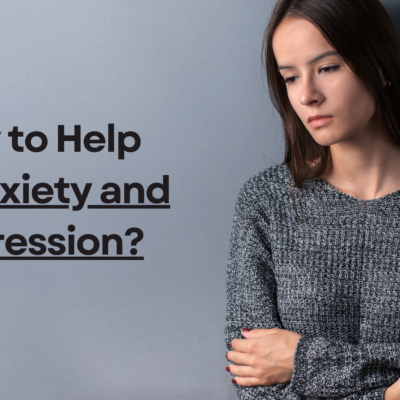How to Help My Anxiety and Depression: Living with anxiety and depression can be an overwhelming and challenging experience, affecting different parts of your life. While seeking professional help is necessary, there are also multiple self-help techniques you can integrate into your daily practice to manage and relieve its symptoms. In this article, we will provide a complete guide to help you handle the journey towards improved mental well-being.
Also Read:
- How to Let go Past?
- Is Love Stronger than Hate?
- How To Be Less Judgmental?
- How to Improve your Emotional Wellness?
- How to Get Rid of Guilty Pleasure?
How to Help My Anxiety and Depression?
Accept and Understand Your Feelings
The first step in handling anxiety and depression is accepting and understanding your feelings. Take the time to reflect on your emotions and recognize triggers. Journaling can be a useful tool for self-reflection, enabling you to gain wisdom into practices and recurring themes.
Set up a Support System
Building a strong support system is important for dealing with anxiety and depression. Share your feelings with trusted friends, family members, or a support group. Open communication encourages a sense of connection, decreasing feelings of isolation. Surrounding yourself with a supportive network can provide comfort and motivation during difficult times.
Prioritize Self-Care
Self-care plays an important role in handling anxiety and depression. Set a routine that prioritizes your well-being. Make sure you are getting enough sleep, eating nutritious meals, and engaging in physical activity. Regular exercise has been shown to release endorphins, the body’s natural mood booster.
Set Realistic Goals
Break down your day-to-day tasks into manageable goals. Setting practical and attainable goals can provide a sense of achievement, increasing your self-esteem. Celebrate small wins and acknowledge your efforts, even when progress appears slow. Remember that it is okay to ask for help when needed.
Practice Mindfulness and Meditation
Mindfulness and meditation are effective tools for handling anxiety and depression. These practices promote living in the present moment and creating a non-judgmental understanding of your thoughts and feelings. Apps and online resources can guide you through mindfulness exercises, making it easier to incorporate these practices into your everyday routine.
Challenge Negative Thoughts
Negative thought habits can worsen anxiety and depression. Challenge and reframe these beliefs by asking yourself if they are based on facts. Replace negative self-talk with optimistic claims. Cognitive-behavioral therapy (CBT) is an evidence-based healing approach that can be particularly effective in addressing and changing negative thought patterns.
Establish Healthy Habits
Healthy habits contribute to overall well-being. Limit caffeine and alcohol intake, as they can worsen anxiety and depression. Make sure that you have a balanced diet rich in nutrients that support brain health, such as omega-3 fatty acids found in fish, nuts, and seeds. Hydration is also important for supporting optimal mental function.
Create a Relaxation Routine
Integrate relaxation techniques into your daily routine to relieve stress and anxiety. Activities such as deep breathing exercises, developed muscle relaxation, and guided imagery can encourage a sense of peace. Find what works best for you and commit to incorporating relaxation into your schedule regularly.
Engage in Meaningful Activities
Determine activities that bring you joy and a sense of meaning. Engaging in hobbies or volunteering can provide a favorable outlet for self-expression and social interaction. Following activities that align with your values and interests can contribute to a more fulfilling and significant life.
Seek Professional Help
While self-help strategies are helpful, seeking professional help is important for complete mental health care. Therapists, counselors, and psychiatrists are qualified to provide support and guidance tailored to your personal needs. Medication may also be advised in some cases, and a mental health professional can help choose the most suitable treatment plan.
At The End
Handling anxiety and depression is a continuous process that requires dedication and self-compassion. By including these practical strategies in your daily routine, you can take visionary steps toward enhancing your mental well-being. Remember that progress may be incremental, and it’s important to celebrate small wins along the way. If you find yourself struggling, do not hesitate to reach out to a mental health professional for further support and advice on your journey to a healthier mind.








